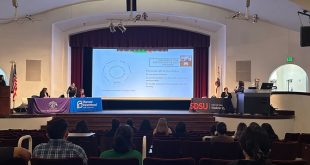
(On the left: Picture of Cetys University MBA graduate, Elvira Burgueño)
By: Miguel Urriza
Dean of Extension and Continuing Education
CETYS Universidad, Campus Mexicali
June is the month of graduations. Thousands of new graduates go from the classroom into the “real world”. Behind are the days of grades, tests, and professors. Some will be even convinced it’s the last time they will ever step into a classroom. Homework, school projects, team assignments and their deadlines are a thing of the past now or aren’t they? These new grads are about to realize that the “real world” is one big capstone project where we learn that in spite of all those years in school, they didn’t teach us everything and we have to keep learning. In fact, they have just realized that they have become students for life.
In school we learn concepts that can be transferred and used in this new world we venture into or, in cases like mine, where we’ve been in for a while now. This knowledge is given to us in a modular way, that is; in bits and pieces. Sometimes these bits and pieces are disconnected, irrelevant to each other. The student learning probability and statistics finds it hard to understand how the use of the standard deviation relates to his life or his major, especially when the latter has a focus on administration or services. Some majors have capstone projects before graduation, but even if they didn’t, as I previously mentioned, work per se is a big capstone project.
Once we enter the world of work, the company, your boss, your job expect you to apply everything you have learned, or should have learned, in a comprehensive manner. They also expect you to “think out of the box” and to creatively take your knowledge and skills beyond what you were taught in school… beyond the conventional. You will find problems that require a solution and realize that the standard deviation and algebra will not be of any help, or would they be? Depending on the problem, the answer may be ‘yes’. There will be some other situations in which they will not. For these new challenges you need to know about conflict management, interpersonal relationships management or perhaps some specific technical knowledge to operate a machine or use some software that is only used in your job. Everything you learned in school has prepared you for these challenges, but not necessarily for the circumstances in which you will find them.
The most competitive universities have foreseen this and as a result encourage internship or work placement programs among their students as well as the acquisition of work experience by making agreements with companies where students can get involved in projects that offer value instead of only clerical work. These universities seek and promote these projects. They offer class schedules and academic work load accordingly so that students may be able to take full advantage of these opportunities. By doing so, students are made aware of the realities of work and gain job experience prior to graduation. These universities produce graduates with work experience who are better prepared for real life.
Work experience prior to graduation is a big help and provides new grads with a “soft landing” into work life. However, all of us who have ever worked realize sooner rather than later that school didn’t teach us everything and that, depending on where you work or your position, there are skills and knowledge that you need to develop either because you never learned them or because of new technology or updates; what you knew is now obsolete. Whether you’re a recent grad or a seasoned worker, you must keep on learning to stay current and ready to take on new challenges.
Never fear, universities know this and that’s why most have some kind of continuing education department or executive training program. I know the university where I work does. CETYS University has a department of University Extension and Continuing Education to take care of these challenges. Continuing Ed. Departments are the constant link between academic and workforce development. They work for the development of new and current skills and to deliver the necessary tools to take on everyday tasks more efficiently and effectively. To this extent, what was learned in school stays current and creates a scaffolding for new skills that will allow its students to grow professionally and be ready to take on greater responsibility and further reach.
Continuing Education is very flexible as it does not only focus on technical and workforce training. Its programs are very broad and offer an array of options for quality of life improvement in topics such as health and nutrition, well-being, emotional health and even interior design and decoration. They help bring your personal and professional life into balance.
Just before we finish here, I would like to invite you to stay active, current, and in constant personal and professional development and learning. I would like to invite you to become a life-long learner. Don’t know where to begin? Check out www.cetys.mx/educon for options and give your first step.





